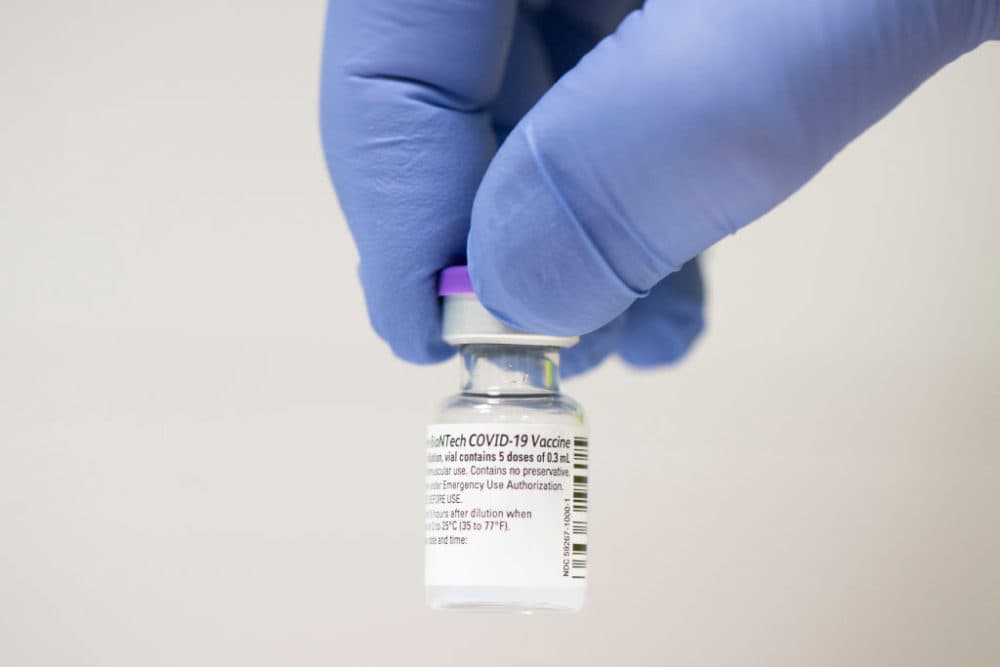Advertisement
Anti-Coronavirus Vaccine Movement Grows, Fueled By Online Misinformation, Conspiracies

Within weeks, the first Americans outside clinical trials could be rolling up their sleeves to receive the coronavirus vaccine.
Public health experts agree it's our best shot at ending the pandemic. But as the virus spreads, so does the anti-vaccine movement, fueled by an amalgam of players — some who distrust politicians, others who oppose government rules, and many who believe misinformation and conspiracy theories about vaccines.
Anti-vaccine books now top the search list on Amazon and Barnes & Noble websites, according to Bloomberg News. And a recent Lancet article says the anti-vaccine movement added 8 million people over the last year, with 31 million people now following anti-vaccine Facebook groups and 17 million subscribe to YouTube accounts.
Anti-vaccine messages are often shared on pages that primarily focus on something else, says Renée DiResta, research manager at Stanford's Internet Observatory. That’s why researchers are struggling to get an accurate sense of how many people believe what’s posted on these pages.
“A page may not have a primary focus on what some would consider to be a core anti-vaccine belief, but they're concerned about another issue that's adjacent or related,” she says. “So you come for the organic food, the babywearing, and then in the course of that, you are also all of a sudden becoming the recipient of constant pushes of messages related to this other thing that you may not necessarily have joined for.”
The anti-vaccine movement is reaching people on both sides of the aisle. Seven to eight distinct versions of anti-vaccine messaging exist, DiResta says.
Some people focus on the health aspect, claiming that vaccines contain toxins and clinging on to the long-debunked conspiracy that vaccines cause autism. Some religious people believe people don’t need vaccines because God made them perfect, she says, while conservatives think the government encouraging vaccination is tyranny.
With the Food and Drug Administration swiftly moving to authorize a COVID-19 vaccine, people are looking for information about it in their online communities, from parenting groups to school reopening groups, she says.
“Oftentimes the thing that is going to help make the decision is who you trust,” she says. “The facts are on the side of the people who have communicated the value of vaccines. So it's not that there's a lack of facts.”
For years, studies looking at routine school immunizations have shown that vaccines are safe, DiResta says. But “heart-wrenching” stories from families who had unrelated negative experiences adjacent to getting vaccines can scare people, she says.
Advertisement
“When you're presented with dry statistics versus a first-person YouTube video of a mom telling her story, oftentimes people find the YouTube video much more resonant,” she says.
Some anti-vaccine conspiracy theorists think the government is hiding effective COVID-19 treatments from the public to profit off of the vaccine, she says, and others believe Bill Gates is using it to plant microchips in people. Some believe the vaccine will turn people into antennas for 5G wireless technology.
These theories sound outlandish, but once they gain traction within niche communities, the narrative continues to spread elsewhere, she says. Researchers are noticing attempts to obscure the source of false information about vaccines.
People were sharing a screenshot of a WordPress page that said the COVID-19 vaccine was going to sterilize people as a meme, she says, for example. The infographic looked legitimate, but the claims were coming from a random blog instead of a legitimate source.
“That's just not immediately obvious to people when they encounter the information on their social feeds,” she says.
President Trump celebrated the vaccine discoveries as a victory, but years ago he repeated the false claim that vaccines cause autism.
People on the left have said they won’t trust a vaccine that comes out of Trump’s FDA, but now DiResta predicts this distrust will shift to the right when President-elect Joe Biden enters office. Some people won’t trust politicians or media that doesn’t align with their partisan community, she says.
A recent survey found only 14% of Black Americans said they thought a coronavirus vaccine would be safe. Because of the long history of distrust of the medical community, Black Americans need to feel like they can trust the vaccine and aren’t being exploited, she says.
Community organizations and religious leaders need to inform people about the COVID-19 vaccine, she says.
“Those are the voices that have to be incorporated into the conversation about any vaccine rollout,” she says, “because their moral authority is so key at this point to countering wild accusations and sensationalism that prey on people's fears.”
Studies show 75% of the population needs to get vaccinated to control the outbreak. DiResta says she worries that won’t happen because of the “why should I have to?” narrative surrounding the vaccine.
“I think that we need to make sure that anybody who's communicating about why these vaccines matter is explaining the value to all of society, not just to the individual,” she says. “And how any restoration of our old way of living is something that we bear a collective responsibility for.”
Karyn Miller-Medzon produced and edited this interview for broadcast with Tinku Ray. Allison Hagan adapted it for the web.
This segment aired on December 8, 2020.

